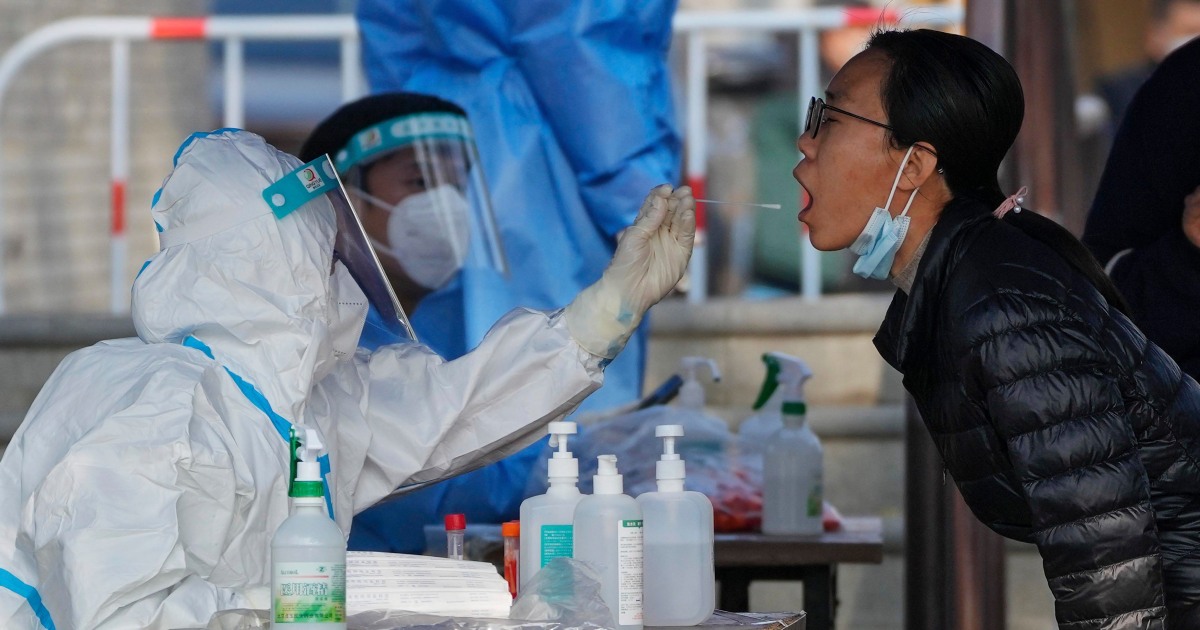BEIJING — China on Friday eased some of its draconian Covid rules, including shortening quarantines by two days for close contacts of infected people and for inbound travelers, and removing a penalty for airlines for bringing in too many cases.
The loosening of the rules, which came a day after China’s new Politburo Standing Committee discussed Covid during a meeting chaired by President Xi Jinping, cheered markets, with Shanghai’s benchmark CSI 300 jumping 3% and the yuan currency extending gains to a one-month high.
Under the new rules, centralized quarantine times for close contacts and travelers from abroad were shortened from seven days to five days. The requirement for three further days in home isolation after centralized quarantine remains.
China will also stop trying to identify “secondary” contacts — a major annoyance for residents of cities who find themselves caught up in sweeping contact-tracing efforts when a case is found — while still identifying close contacts.
“Optimizing and adjusting prevention and control measures is not relaxing prevention and control, let alone opening up and ‘laying flat,’ but to adapt to the new situation of epidemic prevention and control and the new characteristics of Covid-19 mutation,” the National Health Commission (NHC) said.
Also, China is adjusting its categorization of Covid risk areas to simply “high” and “low” risk — eliminating the “medium” category, an effort to minimize the number of people coming under control measures.
The NHC also said it would develop a plan to accelerate vaccinations, which experts say is widely needed before the country can begin more fully dialing-back a zero-Covid policy that has made China a global outlier and inflicted significant economic costs.
The easing of rules comes even as case numbers surge to their highest in months, with Beijing and the central city of Zhengzhou seeing record tallies.
Authorities reported 10,535 new domestically transmitted cases for Thursday, a low number by global standards but China’s highest number since April 29, when the commercial hub of Shanghai was battling its most serious outbreak under strict lockdown.
The southern city of Guangzhou — a manufacturing and transport hub and the new epicenter of China’s Covid fight — reported 2,824 new local cases for Thursday, the fourth day in which infections exceeded 2,000.
Driving the surge were cases in the populous Haizhu district, which on Friday extended a lockdown until Sunday. At least three of Guangzhou’s 11 districts have been put under some sort of restriction.
“All residents are required to stay at home,” the district government said in a statement. “Only one person in each household is allowed to buy daily necessities on a staggered schedule.”
All public transit in the district of 1.8 million people has been suspended, and mandatory P.C.R. tests will be administered to “every household and every individual,” it said.
Will Zhang, 30, a postgraduate student, said universities in Guangzhou have been put under curbs, including a sprawling university town in Panyu district with more than a dozen institutions and a population of more than 300,000.
“Since yesterday, campuses located inside the Guangzhou University Town have been under a lockdown where people are only allowed to leave but not enter,” Zhang said.
In some cases, construction cranes have been used to deliver food to students locked in multi-story dorms, he said.
Beijing, Zhengzhou and Chongqing also tightened measures as daily cases rose to around all-time highs.
Zhengzhou, capital of central Henan province, reported 2,988 new cases, more than double the number a day earlier, in a widening outbreak that has thrown an iPhone assembly plant of Apple supplier Foxconn into chaos.
In the southwestern metropolis of Chongqing, cases remained in the triple digits all week, with a new high of 783 on Thursday. Some districts on Friday banned dining at restaurants and some subway stations were closed.
Beijing reported a record 118 new domestic cases for Thursday, which is still low compared with other Chinese cities.
Authorities in many parts of the city of nearly 22 million people have urged residents to take daily P.C.R. tests, or be barred entry to public spaces including offices, leisure venues and fitness centers.
“This meeting further illustrates policymakers have started to focus more on optimizing the Covid control policies,” Goldman Sachs said in a note following Thursday’s Politburo Standing Committee meeting but before Friday’s announcement.
“We continue to expect policymakers to start preparation work for the gradual relaxation of the ‘dynamic Zero Covid’ policy stance while the actual relaxation might only begin by the second quarter next year.”
Share your story or advertise with us: Whatsapp: +2347068606071 Email: info@newspotng.com













